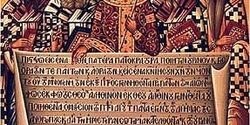
A Biblical Reason for Studying Church History
Michael A.G. Haykin
Pace the canons of contemporary historiography, a key reason presented by the Word of God for the study of Church History is to find models for imitation. In Hebrews 13:7, the preacher of this tremendous holy text urges his hearers to “remember [their] leaders, who spoke the Word of God to you. Pondering carefully the outcome of their way of life, imitate their faith.”
How is the Christian community to view such preachers/teachers of the past?
First, they are to “continue to remember” such men/teachers/preachers. The use of the present imperative stresses continual remembrance.[1] What is the nature of this remembrance?
It is summed up first in the participle anatheōrountes. This word has the basic idea of looking at something again and again, examining and observing it carefully.[2] One source defines it thus: “to closely view with attention, to scrutinize closely.”[3] Now, how is the participle being being used here? Is it imperatival, thus indicating a command in addition to remember?[4] Or is it the means by which we remember?[5] Either way, it is strong directive to spend time reflecting on the lives of past leaders in the church.
What especially is to be scrutinized? Their “way of life”—“the “sum total” or “achievement” of their day-to-day behavior, manifested in a whole life.”[6] Note what this says is required of leaders: godly lives and, to some degree, transparent lives. See also in this regard 2 Timothy 3:10–11. And what is required of Christians in general? This is nothing less than an admonition to be familiar with history of Christian leadership.
Finally, believers are to imitate (mimeisthe) the faith-informed lives of these men. The idea of imitation has already been mentioned explicitly in Hebrews 6:12 and by implication in Hebrews 11. Here, is nothing less than a key reason for the study of Church History.
This is not hagiography for undergirding the command to imitate these men’s faith is the object of their faith: “Jesus Christ, the same yesterday and today and forever” (Hebrews 13:8). It is because Christ Jesus was at the centre of these men’s preaching and living, their lives can be imitated today since He never changes.
[1] William L. Lane, Hebrews 9–13 (Word Biblical Commentary, vo.47B; [Dallas: Word,] 1991), 522, note a.
[2] BDAG3, s.v. See also Lane, Hebrews 9–13, 522, note c.
[3] [Wayne Barber and Spiros Zodhiates et al.], Woodland Park Baptist Church: Constitution and Bylaws (Chattanooga, Tennessee: Woodland Park Baptist Church, 2003), “Appendix I: On Hebrews 13:7”, p.22 (available at: http://www.woodlandpark.org/downloads/wpbcConstitution.pdf; accessed March 20, 2010).
[4] Thus George J. Zemek, “The Modeling of Ministers” in Richard L. Mayhue and Robert L. Thomas, eds., The Master’s Perspective on Pastoral Ministry (Grand Rapids: Kregel, 2002), 268, n.61.
[5] Thus Luke Timothy Johnson, Hebrews. A Commentary (Louisville: Westminster John Knox Press, 2006), 346: “ ‘remembering’ through ‘gazing’.”
[6] Philip Edgcumbe Hughes, A Commentary on the Epistle to the Hebrews (Grand Rapids: William B. Eerdmans Publ. Co., 1977), 569. On the interpretation of ekbasis, see especially BDAG3, s.v.; Hughes, Hebrews, 569, n.18; Lane, Hebrews 9–13, 522, note d. Compare the desire of the writer in Hebrews 13:18.
Michael A. G. Haykin is Professor of Church History and Biblical Spirituality at The Southern Baptist Theological Seminary. He has authored numerous books including: The Spirit of God: The Exegesis of 1 and 2 Corinthians in the Pneumatomachian Controversy of the Fourth Century (E. J. Brill, 1994); One Heart and One Soul: John Sutcliff of Olney, His Friends, and His Times (Evangelical Press, 1994); Kiffin, Knollys and Keach: Rediscovering Our English Baptist Heritage (Reformation Today Trust, 1996); ‘At the Pure Fountain of Thy Word’: Andrew Fuller as an Apologist (Paternoster Press, 2004); Jonathan Edwards: The Holy Spirit in Revival (Evangelical Press, 2005); The God Who Draws Near: An Introduction to Biblical Spirituality (Evangelical Press, 2007); The Christian Lover: The Sweetness of Love and Marriage in the Letters of Believers (Reformation Trust, 2009); The Empire of the Holy Spirit (Borderstone Press, 2010); Rediscovering the Church Fathers: Who They Were and How They Shaped the Church (Crossway, 2011). Haykin is the director of the Andrew Fuller Center for Baptist Studies and blogs at Historia ecclesiastica. Haykin is married to Alison and they have two children, Victoria and Nigel.

